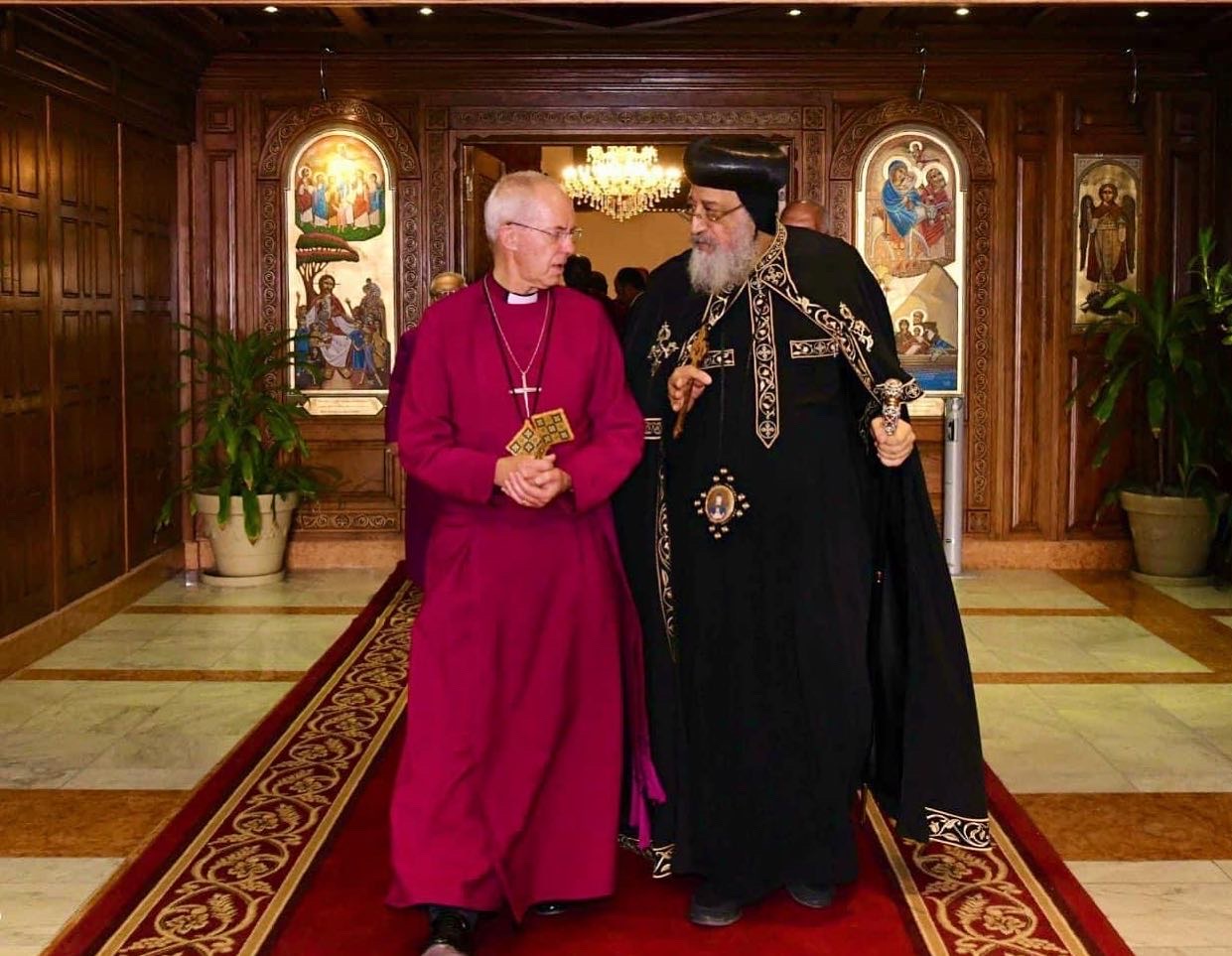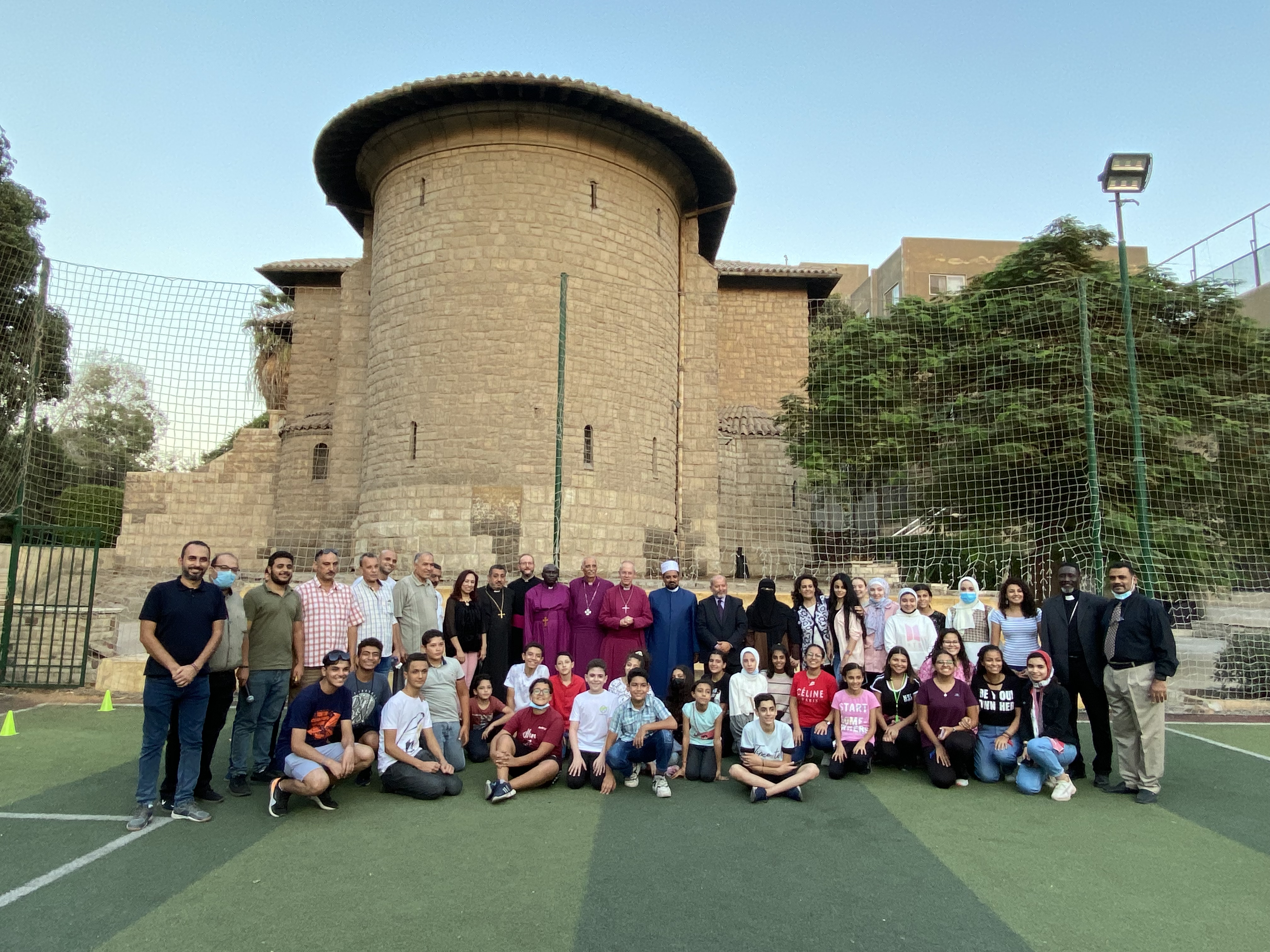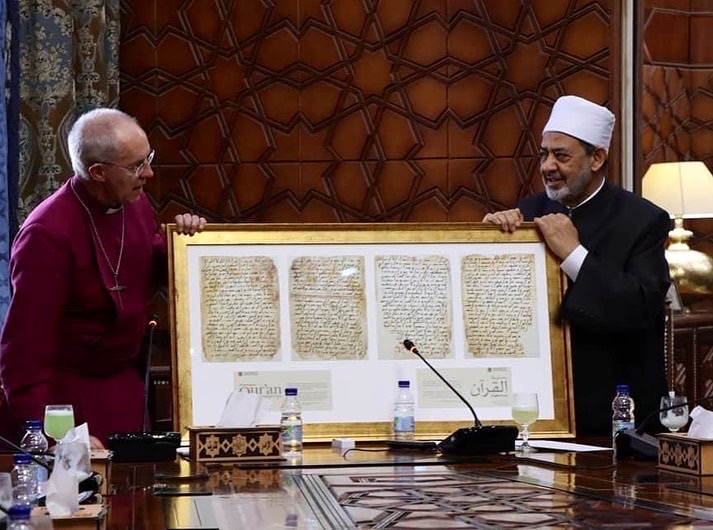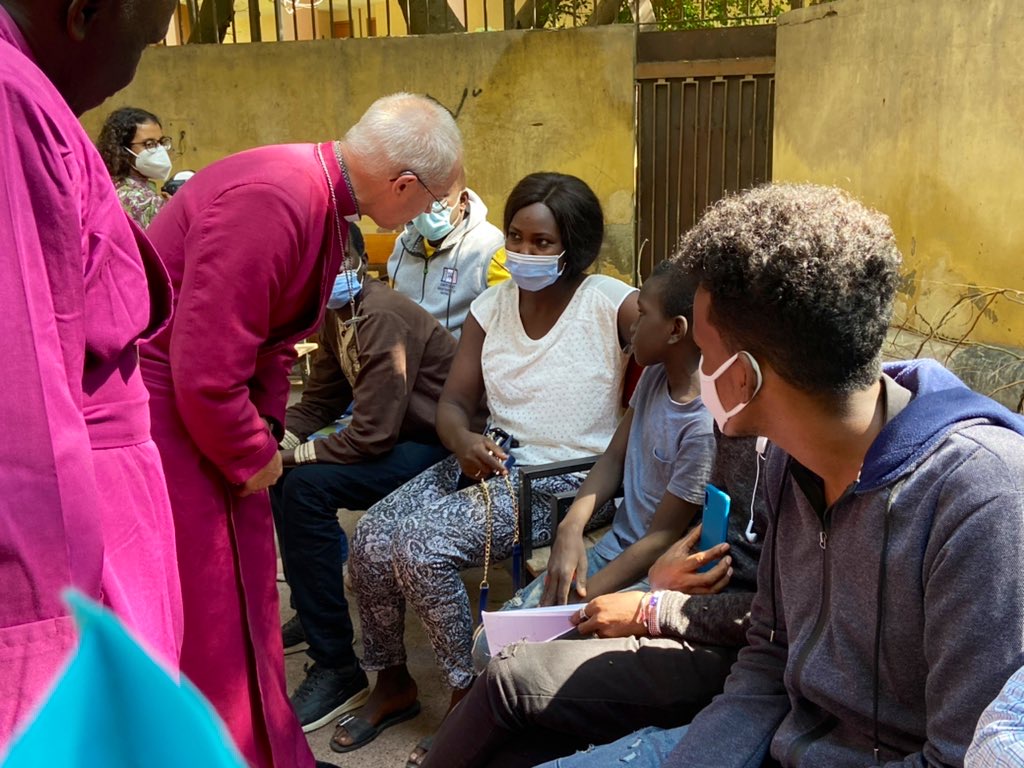The Archbishop of Canterbury has concluded a four-day visit to Cairo to celebrate the new Anglican Province of Alexandria.
Concluding a four-day visit to Cairo, the Archbishop of Canterbury has praised the faithful witness of the Anglican Church in Egypt and said we must work together to build “a fairer, more peaceful, more just and more compassionate world.”
The Archbishop made the visit from 7th – 11th October to participate in celebrations for the Province of Alexandria, which were postponed last year due to the Covid-19 pandemic. Archbishop Justin and Mrs Caroline Welby travelled to Egypt at the invitation of the recently-installed Primate of the Province of Alexandria, Archbishop Samy Shehata.
Archbishop Justin preached at All Saints’ Cathedral during a special thanksgiving service attended by Anglican Primates, clergy from the new Province, and ecumenical and Muslim leaders and representatives.
The Archbishop also met with Christian and Muslim leaders, and with Mrs Welby visited some of the many projects run by the Diocese of Egypt working with refugees, Egyptian families living in poverty and people living with disabilities, among others. They were accompanied by Archbishop Samy and his wife, Madlaine, throughout the trip, as well as by Archbishop Emeritus Mouneer at many engagements.
During the visit, the Archbishop frequently returned to some key themes: firstly, an encouragement for Christians to remain focussed on Jesus Christ and seek Him above all else – which he said “strengthens both our shared journey as Christians towards greater unity and service of others, and our personal journeys in pursuit of holiness.”
Secondly, the vital role of the Anglican Church in Egypt and across the new Province in meeting the needs of communities, especially those who are vulnerable, excluded or living in poverty.
And thirdly, the need for Christians and Muslims to “continue striving for peace, dialogue and partnership, especially at a time of multiple crises around the world and with conflict between faith groups a destructive dynamic in many places.”
In his sermon on Friday, the Archbishop said Egypt had again “found its historic place as a place of meeting, of refuge. It has been so from before Jacob and Joseph, it rescued the Holy family.”
“Luke’s stories in Gospel and Acts are of refugees, the poor, those of no honour. Seen in hospitals, schools, prisons, rubbish dumps and food centres. Seen here in the past and now."
He encouraged the new Province to be guided by God’s word and Spirit. “Anglican Provinces are autonomous. They run themselves - there is no global authority - but they are interdependent. We are linked by love, not by law,” he said.
He referred to the history of conflict between Christians and other faiths, and made a renewed call for peace between religions. “Christians are to be part of a Church that is told to conquer with love and peace, never, never with a sword, a bomb or a plot,” he said. “Either Christians demonstrate the truth of God or they demonstrate nothing by the quality of their lives.
Turning to address Muslim guests in the congregation, he added: “And I say to our dear friends from the Islamic community: how often Christians have got this wrong. Our history is one of the tragic sin of force. Let us be people of peace together.”
Before the service, the Archbishop spent time meeting and praying with Anglican Primates who had travelled to Cairo for the celebrations: the Most Revd Azad Marshall, Moderator of the Church of Pakistan; the Most Revd Hosam Naoum, Archbishop of Jerusalem; and the Most Revd Ezekiel Kondo, Archbishop of Sudan.
During the visit the Archbishop met with leaders of the Coptic, Coptic Catholic and Greek Orthodox Churches in Egypt: His Holiness Pope Tawadros II, His Beatitude Ibrahim Isaac Sidrak and His Beatitude Theodoros II. He also met with Archbishop Foley Beach, the Archbishop of the Anglican Church of North America.
In these meetings Archbishop Justin spoke of the deep roots of Egyptian Christianity and praised the commitment among Egyptian churches to dialogue, partnership and walking together as disciples of Jesus Christ. He thanked them for being brothers and sisters to the Anglican churches in Egypt and across Africa, and for the bonds of friendship and shared ministry that characterise these relationships.
The Archbishop met with several Muslim leaders, including the Grand Imam of Al-Azhar, Dr. Ahmed El-Tayyeb. During the meeting they renewed their commitment to working together for peace, dialogue and partnership between Christians and Muslims. He also met with the Grand Mufti of Egypt and spoke of the role of faith leaders in tackling extremism and modelling leadership focussed on peace, understanding and the common good.
On Thursday, the Archbishop began his visit by praying at St Macarius Monastery in Wadi Natrun. He had a time of spiritual conversation with the Coptics monks at the monastery, which was founded in 360AD.
He also visited Harpur Memorial Hospital in Sadat City, one of many healthcare facilities run by the Diocese of Egypt. He opened a premature baby unit, which was a gift from the British Charitable Fund of the British Embassy in Egypt, and talked with hospital staff and prayed for them. The Archbishop said the new unit and the hospital were “a symbol and sign of God’s love and care for every one of his children”, as well as an example of the vital role that Anglicans play in healthcare in many countries.
On Saturday, the Archbishop and Mrs Welby visited Refuge Egypt, a programme based at All Saints’ Cathedral that offers humanitarian assistance, healthcare, education and training to refugees to support them in integrating into Egyptian society. The day before, Mr Welby visited St Michael and All Angels’ Church in the Heliopolis neighbourhood of Cairo, which has welcomed many refugees from Sudan while also providing food packages and other assistance for Egyptian families living in poverty.
The Archbishop said: “Refugees are precious children of God – and the Anglican Church in Egypt is an example to us all in the care it provides to those who have fled their homes. This is the land where Christ himself was welcomed as a refugee child with his parents, and today it remains a place where the light of God shines in the darkness of the world, welcoming those who have fled everything they know to find safety.”
He also visited the Alexandria School of Theology and heard about its efforts to provide theological education for clergy and lay people from across the Diocese of Egypt and around the Communion.
Concluding the trip on Sunday, the Archbishop spent the afternoon and evening at Jesus Light of the World Anglican Church in Old Cairo. There he spent time at the Deaf Unit run by the Diocese of Egypt, which provides extensive services for deaf and hard of hearing children, youth and families. He visited the Planting a Tree of Hope project, which runs activities for young Christians and Muslims to help foster friendships and understanding, and raise a generation of young leaders committed to building bridges between faiths.
The Archbishop joined the congregation for an evening Eucharist service, including children, young people and families from the Deaf Unit. In his sermon, which was translated into Arabic and sign language, he spoke about the God who never abandons us in our suffering, and whose love can guide us from dark times into the light.
Reflecting on the visit, Archbishop Justin said:
“These precious days in Cairo have been filled with a deep sense of the Holy Spirit working through the churches and Christians of Egypt – and blessing the world that God so loves. From beautiful worship in Arabic, English and sign-language, to inspirational church-run projects with refugees and those living with disabilities, it’s been an immersion in a Church alive with the love of Jesus Christ.
“The ancient witness of Egyptian Christianity has been a great blessing to the global Church over many, many centuries. It’s one of the wellsprings of our faith: living water from which we are invited to drink. I rejoice that the new Anglican Province of Alexandria has been called and commissioned to live out the example of the saints – and to share the Gospel across Egypt, the Horn of Africa, Gambella and North Africa. I want to invite all Anglicans to pray for this new Province and the people it will serve.
“Of course, these are difficult and painful times in our world. We are living through not just one but many crises: from the pandemic, to climate change, to burning injustices and deep-rooted conflict. And in almost every conversation I have had during this trip – with Christians and Muslims, refugees and doctors, clergy and congregations – it’s been clear that these crises affect all of us, but especially those who are poorest and most vulnerable.
“As we emerge from the pandemic, we are finding ourselves at a crossroads: we can choose to retreat into fear, isolation and conflict with those who are different from us, or who seem to threaten our interests. Or we can choose, together, to build a fairer, more peaceful, more just and more compassionate world – one that looks more like the Kingdom of Heaven that Jesus points us towards. That will require a renewed commitment to friendship and partnership between faiths, and an ever-deeper sense of unity among Christians. I have seen remarkable signs of both on this trip and I thank God for that.
“This visit has been an urgent reminder that God has come to be with us in this world – the one wounded by conflict, pandemic, climate change, violence and hatred – and he calls us to be bearers of the light of Christ’s peace, justice, hope and redeeming love. That is the light that no darkness can overcome.
“Finally, as always when travelling through the Anglican Communion, I’ve been powerfully reminded that God has called us together as a family – one that speaks many languages and is rooted in many different cultures: but a family that is deeply connected by bonds of friendship, service, prayer, worship and love for Jesus Christ. I give thanks and praise to God for the miracle of our Communion, and I pray that we journey forward together with our gaze fixed on the one who calls us.”
The new Province of Alexandria, which was inaugurated in June 2020, will serve 10 countries across the Dioceses of Egypt, the Horn of Africa – where the number of Anglican churches has grown by several hundred over recent years – Gambella and North Africa.




